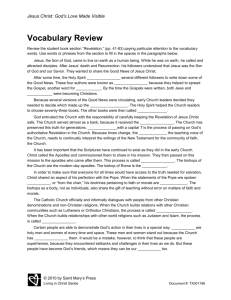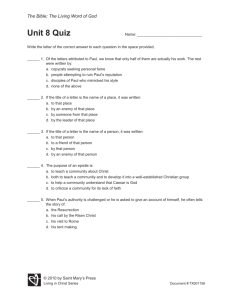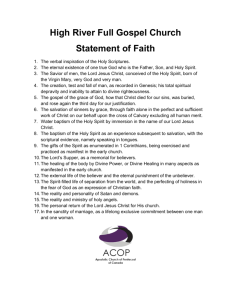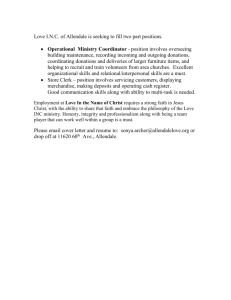L H E C
advertisement
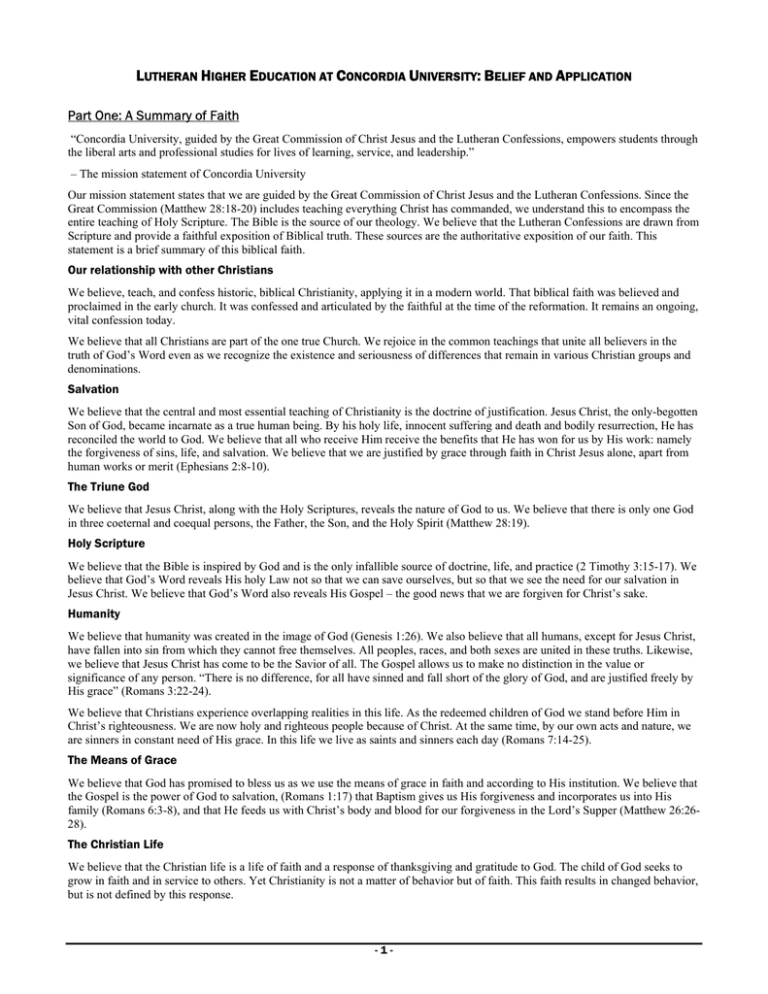
LUTHERAN HIGHER EDUCATION AT CONCORDIA UNIVERSITY: BELIEF AND APPLICATION Part One: A Summary of Faith “Concordia University, guided by the Great Commission of Christ Jesus and the Lutheran Confessions, empowers students through the liberal arts and professional studies for lives of learning, service, and leadership.” – The mission statement of Concordia University Our mission statement states that we are guided by the Great Commission of Christ Jesus and the Lutheran Confessions. Since the Great Commission (Matthew 28:18-20) includes teaching everything Christ has commanded, we understand this to encompass the entire teaching of Holy Scripture. The Bible is the source of our theology. We believe that the Lutheran Confessions are drawn from Scripture and provide a faithful exposition of Biblical truth. These sources are the authoritative exposition of our faith. This statement is a brief summary of this biblical faith. Our relationship with other Christians We believe, teach, and confess historic, biblical Christianity, applying it in a modern world. That biblical faith was believed and proclaimed in the early church. It was confessed and articulated by the faithful at the time of the reformation. It remains an ongoing, vital confession today. We believe that all Christians are part of the one true Church. We rejoice in the common teachings that unite all believers in the truth of God’s Word even as we recognize the existence and seriousness of differences that remain in various Christian groups and denominations. Salvation We believe that the central and most essential teaching of Christianity is the doctrine of justification. Jesus Christ, the only-begotten Son of God, became incarnate as a true human being. By his holy life, innocent suffering and death and bodily resurrection, He has reconciled the world to God. We believe that all who receive Him receive the benefits that He has won for us by His work: namely the forgiveness of sins, life, and salvation. We believe that we are justified by grace through faith in Christ Jesus alone, apart from human works or merit (Ephesians 2:8-10). The Triune God We believe that Jesus Christ, along with the Holy Scriptures, reveals the nature of God to us. We believe that there is only one God in three coeternal and coequal persons, the Father, the Son, and the Holy Spirit (Matthew 28:19). Holy Scripture We believe that the Bible is inspired by God and is the only infallible source of doctrine, life, and practice (2 Timothy 3:15-17). We believe that God’s Word reveals His holy Law not so that we can save ourselves, but so that we see the need for our salvation in Jesus Christ. We believe that God’s Word also reveals His Gospel – the good news that we are forgiven for Christ’s sake. Humanity We believe that humanity was created in the image of God (Genesis 1:26). We also believe that all humans, except for Jesus Christ, have fallen into sin from which they cannot free themselves. All peoples, races, and both sexes are united in these truths. Likewise, we believe that Jesus Christ has come to be the Savior of all. The Gospel allows us to make no distinction in the value or significance of any person. “There is no difference, for all have sinned and fall short of the glory of God, and are justified freely by His grace” (Romans 3:22-24). We believe that Christians experience overlapping realities in this life. As the redeemed children of God we stand before Him in Christ’s righteousness. We are now holy and righteous people because of Christ. At the same time, by our own acts and nature, we are sinners in constant need of His grace. In this life we live as saints and sinners each day (Romans 7:14-25). The Means of Grace We believe that God has promised to bless us as we use the means of grace in faith and according to His institution. We believe that the Gospel is the power of God to salvation, (Romans 1:17) that Baptism gives us His forgiveness and incorporates us into His family (Romans 6:3-8), and that He feeds us with Christ’s body and blood for our forgiveness in the Lord’s Supper (Matthew 26:2628). The Christian Life We believe that the Christian life is a life of faith and a response of thanksgiving and gratitude to God. The child of God seeks to grow in faith and in service to others. Yet Christianity is not a matter of behavior but of faith. This faith results in changed behavior, but is not defined by this response. -1- The Great Commission We believe that Christ has commissioned His people to make disciples of all nations. We believe that all Christians are called to share their faith with others (Matthew 28:18-20). Vocation We believe that God equips people with talents and abilities. Any occupation or interest that is not opposed to God’s Word can be an act of service to Him. While God calls some into vocations of ministry in the church, we believe that God is also pleased when His people live out other vocations to His glory (1 Corinthians 10:31). Part Two: Application of this Biblical Faith Acceptance of this faith This faith is proclaimed and lived at Concordia University. Full time faculty share this confession and have declared their agreement with it. Our staff and adjunct faculty promise that their work will be done in a manner that is consistent with this faith. Staff and students come from a variety of theological traditions. They may share in this confession or continue in their own profession of faith as we live and work together. Engagement with the Bible In our interactions with students and colleagues, we seek to apply this biblical faith along with our academic and professional disciplines. In a variety of ways, our campus community encounters God’s Word (for example, in chapel, Bible studies, personal interactions, and in the ministry of the campus pastor). We believe that the Holy Spirit works through the Gospel to transform the hearts and lives of all who hear and believe its message. Acceptance is not forced We believe that the Holy Spirit works faith through the Gospel. We maintain that this response of faith cannot be coerced or legislated. Students are introduced to the content and application of this faith, and are invited to hear and respond to the Gospel, but a faith-response is not demanded of students. All are to be treated with respect and dignity. “Secular” disciplines We maintain that the pursuit of knowledge and understanding in a variety of academic fields is a valid Christian vocation. It is legitimate for Christians to study and teach subjects that are not directly concerned with the Holy Scriptures. We maintain that serving God in the various vocations that He has given us means that we will strive for excellence in all that we do. We maintain that human knowledge has limits but God’s knowledge is limitless. This may result in challenges and paradoxes in our understanding. Particularly in such times, Christian scholars rely on the Word of God even as they work to understand their discipline. We maintain that it is legitimate to explore and learn about viewpoints, issues, and expressions that are non-biblical and even antagonistic to biblical faith. Such exploration is necessary if we want to comprehend this world, expand our knowledge, and understand our own position. We believe that Christians should understand various viewpoints as they really are and not distort them. At the same time, we believe that Christians should articulate a response to challenges to the Gospel. The two kingdoms We believe that Christians are subject to God’s Word and also to secular authority. On this basis, we maintain that our relationships on and off campus may be guided by the Scriptures in some situations (for example, in chapel, Bible study, or spiritual counsel) and by laws and regulations in other relationships (for example, in residence hall rules or policies on alcohol use). As we are a community of human beings, we maintain that rules and regulations of conduct are necessary for harmonious and orderly living together. These rules, though necessary, are not to be equated with the Gospel. Compliance with rules is not a sign that an individual is a Christian. Rather, these rules are applications of God’s desire for order in our world. Service We believe that God calls His redeemed children to lives of love and service towards others. We maintain that as we use our gifts and abilities in all aspects of our lives, that we fulfill His call for us to be the light of the world. -2-


